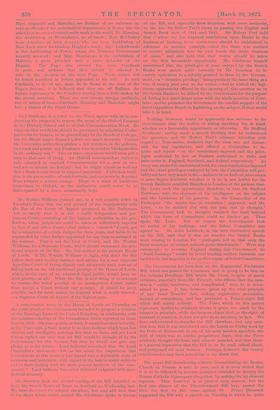Nothing, however, could be apparently less welcome to the Government
than the notion of taking anything big in hand, whether on a favourable opportunity or otherwise. Sir Stafford Northcote, having made a speech showing that he understood the question, and Sir Robert Peel's ultimate intention with regard to Note-issues, declared that the time was not favour- able for any legislation, and offered a Committee to in- quire and report "on the restrictions imposed and the privi- leges conferred by law on Bankers authorised to make and issue notes in England, Scotland, and Ireland respectively." As every one seemed to understand both the exact restrictions imposed and the exact privileges conferred by law, the Committee will pro- bably not have verymuch to do,—unless it be to find out,what seems in some degree doubtful, whether it is or is not lawful for the Scotch Banks to establish Branches in London at the present time.. Mr. Lowe took the opportunity, therefore, to twit Sir Stafford Northcote with the clearness of his intelligence on the subject and the feebleness of his purpose. In the Chancellor of the Exchequer "the native hue of resolution" appeared, said Mr. Lowe, "to be sicklied o'er with the pale east of thought." The Government had, he thought, reached the limit beyond which the force of Committees could no further go. Thus spake Mr. Lowe. But of course the Government took no notice of his badinage, and the Select Committee was agreed to. Sir John Lubbock, in his very instructive speech on the Bill, said that it was no wonder the Scotch Banks were coming to London, for "geologists tell us that even the fossil footsteps of extinct animals point Southwards." Were any catastrophe to overtake England during this Government, its "fossil footsteps" would be found tending neither forwards nor backwards, but lingering in the perfect repose of Select Committees.


































 Previous page
Previous page